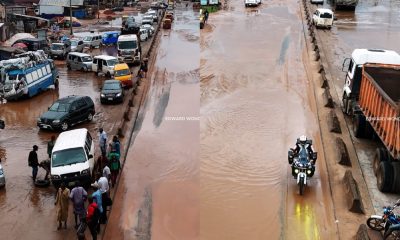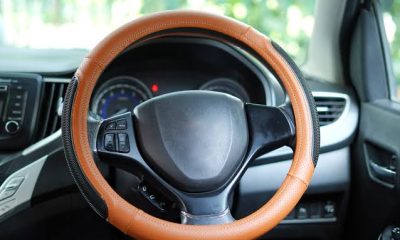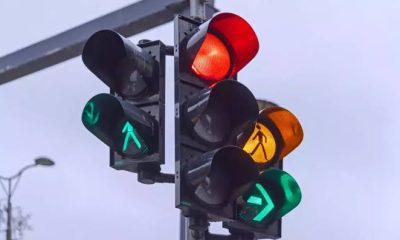Crash News
Necessary Documents for Driving on Nigerian Roads

Driving in Nigeria comes with responsibilities that go beyond simply owning a car and having the skill to operate it. Every motorist is legally required to carry specific documents that prove the vehicle’s identity, its compliance with safety standards, and the driver’s competence.
Also Read: Nigerians to pay higher for number plates and driver’s license- FG
These documents are not mere formalities, they are essential for road safety, accident accountability, insurance claims, and crime prevention.
Unfortunately, many Nigerian drivers still hit the road without proper documentation, either due to ignorance, negligence, or attempts to cut corners. This lack of compliance fuels issues like car theft, insurance fraud, and avoidable clashes with law enforcement.
The Federal Road Safety Corps (FRSC), Vehicle Inspection Officers (VIO), and police authorities have intensified checks nationwide to curb this problem.
This guide provides a comprehensive breakdown of all documents required for driving on Nigerian roads, their importance, renewal timelines, penalties for default, and tips for motorists to stay compliant.
Core Driving Documents Every Nigerian Motorist Must Have
1. Driver’s License
- Purpose: Proof that you are trained, tested, and authorized to drive in Nigeria.
- Issuing Authority: Federal Road Safety Corps (FRSC).
- Validity: 3 or 5 years, depending on what you apply for.
- Process:
- Apply online via FRSC’s license portal.
- Pay applicable fees (₦6,350 for 3 years, ₦10,450 for 5 years – as of 2025).
- Attend biometrics capture.
- Pass vision and driving tests.
- Collect temporary license, with permanent card ready in 60 days.
- Penalty for Non-Compliance: Driving without a valid license attracts fines of up to ₦10,000 and possible vehicle impoundment.
2. Vehicle License
- Purpose: Confirms that your car is legally registered for road use.
- Issuing Authority: State Licensing Office in partnership with FRSC.
- Renewal: Yearly.
- Documents Required for Renewal: Proof of ownership, insurance certificate, and roadworthiness certificate (for commercial vehicles).
- Penalty: Driving with an expired vehicle license attracts a ₦3,000 fine (private) or ₦5,000 (commercial).
3. Proof of Ownership Certificate
- Purpose: Establishes that you are the legal owner of the vehicle. This is crucial in case of theft, sale, or disputes.
- Issuing Authority: State Licensing Offices.
- Required for: Vehicle license renewal, change of ownership, or police clearance.
4. Roadworthiness Certificate
- Purpose: Confirms that your vehicle meets minimum safety and mechanical standards.
- Who Needs It: Mandatory for commercial vehicles; recommended for private cars.
- Issuing Authority: Vehicle Inspection Officers (VIO).
- Process: Vehicle inspection for brakes, lights, tires, emissions, and safety equipment.
- Penalty: Absence attracts fines up to ₦10,000 and possible impoundment.
5. Insurance Certificate
- Purpose: Protects motorists, passengers, and third parties in case of accidents.
- Types in Nigeria:
- Third-Party Insurance (Mandatory): Covers damages to other people’s vehicles and property.
- Comprehensive Insurance (Optional): Covers both your car and third-party liabilities.
- Issuing Authority: Licensed insurance companies approved by NAICOM.
- Penalty for No Insurance: Up to ₦20,000 fine, loss of compensation rights, and possible legal action.
6. Hackney Permit / Commercial Permit (for commercial drivers)
- Purpose: Authorizes use of a private or public vehicle for commercial purposes.
- Issuing Authority: State government or local councils.
- Applies To: Taxis, buses, tricycles, and ride-hailing vehicles.
7. Tint Permit
- Purpose: Legal clearance for vehicles with tinted glass.
- Issuing Authority: Nigerian Police Force (NPF).
- Penalty: Driving with unapproved tinted glass may lead to arrest, fines, or court charges.
8. Emission Test Certificate
- Purpose: Confirms that your vehicle emissions meet environmental safety standards.
- Issuing Authority: VIO in partnership with environmental agencies.
- Status: Currently implemented in Lagos, Abuja, and some states, with plans for nationwide rollout.
Optional but Important Supporting Items
- Fire Extinguisher Compliance Tag – FRSC requires at least one functioning extinguisher in every car.
- Caution Triangle – mandatory for breakdown situations.
- CNG/LPG Conversion Certificate – for vehicles modified to run on alternative fuels.
Verification & Digital Records
The FRSC’s National Vehicle Identification System (NVIS) is Nigeria’s centralized vehicle database. It links licenses, proof of ownership, and insurance records for quick verification. With this system, law enforcement can detect fake licenses, cloned documents, and stolen cars within seconds.
Motorists are advised to always verify their documents online after renewal to avoid falling victim to fake “agents.”
Penalties for Non-Compliance
Driving without valid documents can lead to:
- Vehicle impoundment.
- Fines ranging from ₦2,000 to ₦20,000, depending on the offense.
- Prosecution in mobile courts.
- Loss of insurance claims in case of an accident.
In extreme cases, repeat offenders may face license suspension or revocation.
How to Stay Compliant
- Renew Early: Don’t wait until licenses or certificates expire. Start renewal at least 2 weeks before expiry.
- Verify Authenticity: Use FRSC and state portals to confirm documents are genuine.
- Keep Soft Copies: Scan your documents and keep digital backups.
- Cooperate at Checkpoints: Always present documents calmly to avoid conflict with FRSC, VIO, or police.
Conclusion
Driving in Nigeria is not just about steering wheels and gear shifts, it is about legal compliance, safety, and accountability. Every motorist must treat documentation as a critical part of responsible driving. With FRSC and NVIS technology improving, excuses for non-compliance no longer hold weight.
Having the right documents doesn’t just keep you on the right side of the law; it also protects you, your passengers, and your vehicle from unforeseen risks. In a country where road accidents and theft are common, proper documentation could be the thin line between justice and regret.
Crash News
BMW 328i 3 Series 2014–Sleek, Powerful & Ready for sale

Turn heads with this 2014 BMW 328i, a perfect blend of luxury, performance, and comfort. Known for its strong engine, smooth handling, and premium interior, the BMW 3 Series remains one of the most desirable sedans in its class.
Also check: BMW vs. Mercedes-Benz: Honest Comparison


Key Features:
- Model/Year: BMW 328i, 2014 (3 Series)
- Transmission: Automatic (Tiptronic/Sport mode)
- Engine: 2.0L Turbocharged, excellent fuel efficiency
- Mileage: 172,769
- Interior: Premium leather seats, modern infotainment system, Bluetooth, AUX/USB, climate control
- Exterior: Sleek design with alloy rims, sharp headlights, and signature BMW kidney grille
- Condition: Super clean, buy-and-drive, no faults
- Documents: Fully registered, custom duty paid

Price: $13,000 (slightly negotiable)
Location: Calabar, Nigeria.

Why Choose This BMW?
- Timeless German engineering
- Luxurious yet sporty design ✨
- Fuel-efficient for daily use ⛽
- Durable and reliable performance

Contact Now: +234 912 405 0370
Schedule a test drive today and experience the thrill of owning a BMW!
Crash News
Roadside Survival Kit: 12 Essential Items Drivers Must Carry

No motorist ever leaves home expecting a breakdown, flat tire, or emergency on the road. Yet, Nigeria’s highways, whether it’s the Lagos–Ibadan Expressway, Abuja–Lokoja, or Enugu–Port Harcourt are unpredictable.
Also Read: The Dangers of Careless Overtaking: A Road Safety Concern
Between poor road conditions, heavy traffic, and limited roadside assistance, even a minor fault can become a serious safety risk if you’re unprepared.
This is why every driver in Nigeria needs a roadside survival kit, a set of essential items that could mean the difference between a quick recovery and hours of frustration, or worse, life-threatening danger.
Beyond the required legal documents, these physical tools and supplies provide peace of mind and security for motorists.
This article highlights 12 essential items Nigerian drivers must carry for emergencies, safety, and compliance with road safety regulations.
1. Fire Extinguisher
- Why it matters: FRSC mandates that every car must carry a functional fire extinguisher. Car fires can start from overheating, fuel leaks, or electrical faults.
- Tip: Always check expiry dates. Powder extinguishers (1kg–2kg) are ideal for passenger cars.
2. Caution/WARNING Triangle
- Why it matters: Mandatory under road traffic laws. It alerts oncoming vehicles if your car breaks down, especially at night or on highways.
- Tip: Always carry at least two reflective triangles. Place them 30–50 meters behind and in front of your car.
3. First Aid Kit
- Why it matters: Immediate response to injuries after a crash can save lives before professional help arrives.
- Contents: Bandages, antiseptic, gloves, scissors, cotton wool, and pain relievers.
4. Spare Tire, Jack, and Wheel Spanner
- Why it matters: Potholes and nails make flat tires common in Nigeria. Without a spare tire and tools, you risk being stranded in unsafe areas.
- Tip: Check your spare tire pressure monthly.
5. Torchlight (Rechargeable or Battery-Powered)
- Why it matters: Essential for breakdowns at night or in poorly lit roads.
- Tip: Keep spare batteries or a solar/rechargeable flashlight.
6. Jumper Cables
- Why it matters: Car batteries can die unexpectedly. Jumper cables let you restart your car with another vehicle’s help.
- Tip: Choose heavy-duty cables at least 10 feet long.
7. Tow Rope
- Why it matters: In case your vehicle completely breaks down, a tow rope ensures you can be moved to safety or the nearest mechanic.
- Tip: Get a durable nylon/polyester tow rope rated for your car’s weight.
8. Basic Tool Kit
- Why it matters: Small faults like loose battery terminals or blown fuses can be fixed roadside with basic tools.
- Contents: Screwdrivers, pliers, adjustable spanner, duct tape, and spare fuses.
9. Reflective Jacket
- Why it matters: If you need to step out on a highway at night, a reflective vest makes you visible to other drivers.
- Tip: FRSC officers increasingly check for reflective jackets during stops.
10. Water and Snacks
- Why it matters: Long delays caused by breakdowns or traffic can leave you dehydrated or weak. Bottled water and snacks provide energy until help arrives.
11. Mobile Phone Charger/Power Bank
- Why it matters: Your phone is your lifeline for calling mechanics, family, or emergency services. A dead battery could leave you stranded.
- Tip: Carry a high-capacity power bank (10,000 mAh+).
12. Vehicle User Manual
- Why it matters: Many motorists neglect the manual, yet it contains instructions on troubleshooting common faults.
- Tip: Keep it in your glove compartment for easy reference.
Extra Items to Consider
- Raincoat/umbrella for bad weather.
- Small cash for emergencies (areas with no POS/transfer).
- Portable air compressor for inflating tires.
- Toilet roll when press
Why This Matters in Nigeria
Unlike developed countries where roadside assistance is readily available, Nigerian motorists often have to rely on self-help during emergencies. Kidnap-prone highways, poorly lit roads, and lack of emergency hotlines make preparedness non-negotiable.
FRSC emphasizes that drivers who carry essential safety kits not only protect themselves but also help reduce secondary accidents caused by breakdowns left unattended.
Conclusion
Driving in Nigeria comes with challenges from poor road networks to unpredictable breakdowns. But with a well-stocked roadside survival kit, you can handle emergencies with confidence and compliance.
Remember: Preparation is the cheapest form of insurance. The next time you hit the road, check your documents and your survival kit.
Crash News
Fuel Scarcity Threatens Delta State as IPMAN and NUPENG Launch Indefinite Strike

Late Saturday, September 6, 2025, the Independent Petroleum Marketers Association of Nigeria (IPMAN) and the Nigeria Union of Petroleum and Natural Gas Workers (NUPENG) convened an emergency meeting that culminated in a bold announcement: an indefinite strike across Delta State.
Also Read: Petrol Price Hike Amidst Rising Competition and Fuel Import Surge
Effective from 6:00 a.m. on Monday, September 8, all filling stations under their purview will remain shut until further directives from national leadership. A stern warning accompanies the strike: any station found operating will be slapped with a ₦1 million fine.
Implications Across the Region
This action is not isolated. Due to often-shared solidarity among petroleum marketers across the South-South region, the shutdown risks cascading effects beyond Delta State, potentially disrupting fuel supply across neighboring states.
National Response & Healthcare Concerns
The Federal Government is already sounding alarm bells. The Minister of State for Health, Dr. Iziaq Salako, warned that most hospitals heavily reliant on diesel and petrol-powered generators for backup power could face severe disruptions if fuel distribution stalls.
Meanwhile, the Ministry of Labour has stepped in, urging NUPENG to reconsider the strike and embrace dialogue. The call also extends to the Nigeria Labour Congress (NLC), which had issued a “red alert” to its affiliates to support the petroleum workers.
Broader Dispute at Play
This strike stems from deeper tensions between NUPENG and Dangote Refinery. The union accuses Dangote of anti-union labor practices specifically, recruiting drivers for its new fleet of Compressed Natural Gas (CNG) trucks with the stipulation that they do not join existing unions. NUPENG sees this as a violation of Nigeria’s Constitution, the Labour Act, and ILO conventions guaranteeing freedom of association.
In Summary
- Location: Delta State
- Parties Involved: IPMAN & NUPENG
- Action: Indefinite strike; all filling stations to close from 6 a.m. Monday
- Penalty for Non-compliance: ₦1 million fine per station
- Potential Effects: Fuel shortages across Delta and the South-South; disruptions to healthcare services reliant on generators
- Government Reaction: Calls for dialogue, national concern over healthcare impacts

 Driver Training1 day ago
Driver Training1 day agoTop 10 Driving Mistakes Motorists Make

 Car/Vehicle Maintenance24 hours ago
Car/Vehicle Maintenance24 hours ago5 Reasons Why Your Steering Wheel Might Vibrate at Highway Speeds

 Skillful driving12 hours ago
Skillful driving12 hours agoWhy Drivers Keep Ignoring Traffic Lights

 Driver Training11 hours ago
Driver Training11 hours agoDeadly Distraction: Dangers of Phone Use While Driving

 Crash News2 days ago
Crash News2 days agoBMW 328i 3 Series 2014–Sleek, Powerful & Ready for sale

 International Crash Report11 hours ago
International Crash Report11 hours agoGas Truck Explosion Kills Four, Injures 90 in Mexico












